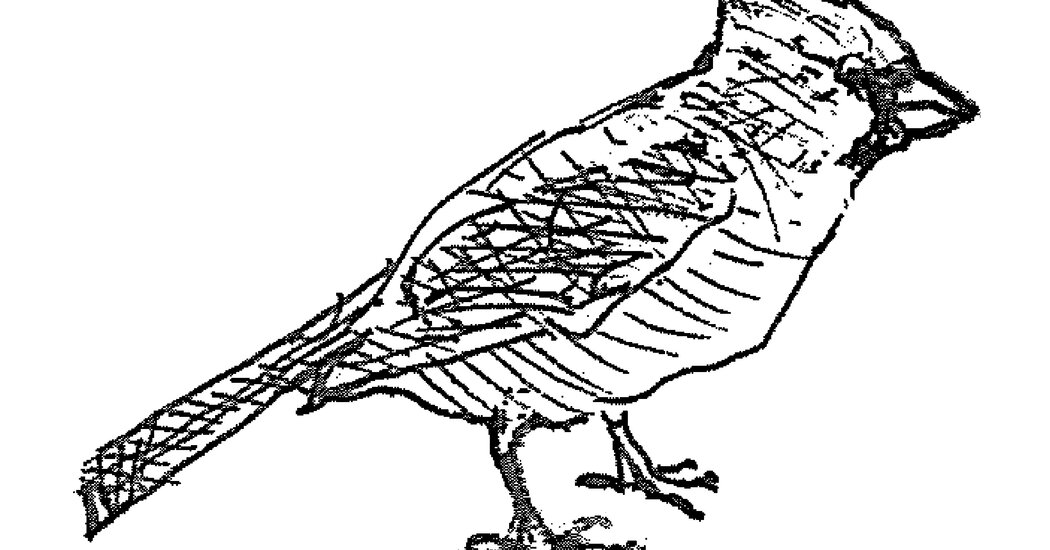

If you enjoy watching birds floating by or chipmunks scampering across your lawn, why not have a go at drawing them to remember what gave you some cheer? With a few basic tips, you can begin making simple drawings. Don’t worry about how good they are. Enjoy that you are learning to see nature. As the writer and naturalist Rachel Carson said, “Those who notice nature will never be bored.”
All you need is a pencil and paper. (You can start in the space at below right.) If your desired subject is not right in front of you, or moves too quickly for you to capture, a field guide or a clear photo from a magazine or online search will do. Choose an image that is in profile, which makes it easier to see your subject’s shape. Keep your drawing small, no more than four inches to begin.
How to begin: Find five or 10 minutes in your day to slow down and be with nature. What would you like to draw, to learn more about? It could be anything — a butterfly, a chickadee, an oak tree, even a green pepper or an apple.
Look very carefully at your subject, figuring out its basic shape. How did it grow and where? How does it live? Remember, this is a stress reliever, not a stress creator. Getting to know your animal is the important thing. Try doing sketches of what you see directly, mostly looking at the animal and not at your paper.
Don’t take more than 15 minutes. If you think folks won’t know what you drew, label it and jot down the date so you remember when you drew it. And if you want to get better, keep drawing.
To help you get started, here are some tips:
1. All mammals can be drawn beginning with three basic circles for hip, belly and shoulder.
2. Once you have those, you can sketch in the other parts — the neck, head, tail, legs and the beginning details.
3. When you have your proportions worked out, add the details of the fur, eye, nose, etc. to create your finished drawing.
1. All birds are drawn beginning with two basic circles for the body and head, their relative size determined by the bird’s anatomy.
2. Add the tail, wing, bit of neck, legs.
3. When you have your proportions worked out, add details of feathers, beak, toes, eye to create your finished drawing.
Whatever kind of animal you are drawing, it’s important to position the eye correctly and to put in a highlight so that it doesn’t look dead. In birds, make sure to draw the upper and lower bill so that the bill can open.
1. Find the basic geometric shape of your flower. Here, the daffodil has a six- pointed star shape as there are six petals.
2. Draw the petals around your star, the center trumpet, the stamen and pistil inside, and then the veins of the petals plus stem (and maybe) leaf beside.
3. In profile, the flower shape is no longer round but oval as it is foreshortened.
Clare Walker Leslie is an internationally known wildlife artist, author, and educator. She has written 13 books on drawing and connecting with nature.
24World Media does not take any responsibility of the information you see on this page. The content this page contains is from independent third-party content provider. If you have any concerns regarding the content, please free to write us here: contact@24worldmedia.com

Common Mistakes When Using Athletic Field Tarps

High-Performance Diesel Truck Upgrades You Should Consider

Warehouse Optimization Tips To Improve Performance

Fire Hazards in Daily Life: The Most Common Ignition Sources

Yellowstone’s Wolves: A Debate Over Their Role in the Park’s Ecosystem

Earth Day 2024: A Look at 3 Places Adapting Quickly to Fight Climate Change

Millions of Girls in Africa Will Miss HPV Shots After Merck Production Problem

This Lava Tube in Saudi Arabia Has Been a Human Refuge for 7,000 Years

Four Wild Ways to Save the Koala (That Just Might Work)

National Academy Asks Court to Strip Sackler Name From Endowment

Ways Industrial Copper Helps Energy Production

The Ins and Out of Industrial Conveyor Belts